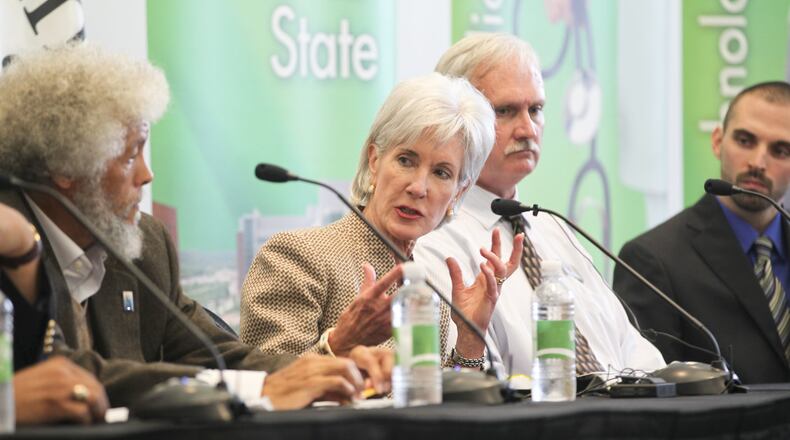“I’m hoping that on Monday Ohio can join the list of states who will be expanding Medicaid,” Sebelius said. “It has a significant impact on the economy and has a significant impact on communities and it has a significant impact on individuals and their families.”
The Controlling Board, a panel composed of mostly state lawmakers, could decide to allow federal dollars to flow to state coffers and expand Medicaid — which enrolls 2.4 million low-income and disabled Ohioans — to an estimated 275,000 uninsured Ohioans.
The Ohio Department of Medicaid received permission from the feds last week to expand, along with $2.56 billion in federal money over two years to cover costs.
Expanding Medicaid eligibility to those earning below 138 percent of the federal poverty level, or about $32,500 for a family of four, was intended to ensure care for people who could not afford insurance with new subsidies. The feds have pledged to pay 100 percent of the expansion cost for the first three years and gradually reduce its share to 90 percent.
Republicans in the Ohio House stripped the expansion proposal from Republican Gov. John Kasich’s budget plan earlier this year, saying the issue needs to be debated separately.
Conservative lawmakers were concerned that the federal government contribution could decrease and Ohio would be stuck with the bills, or that Medicaid is too costly for the quality of care it provides.
Kasich has said Ohio’s share of the Medicaid expansion dollars — $13 billion over seven years, by his account — would go to other states if not used by Ohio.
Greg Lawson of the Buckeye Institute for Public Policy, a conservative think tank, said Kasich’s assumption is incorrect.
“Medicaid is structured in a way that our dollars will not be going to other states if we don’t expand,” Lawson said. “There are high-profile people who have administered the (Medicaid) program who agree with that.”
Sebelius said she was disappointed with the glitches in the new online health insurance marketplace, at healthcare.gov, which she said have been fixed. The marketplace is where uninsured people or those without employer-sponsored health insurance can shop for private plans.
“We will make sure that this program works well, seamlessly for consumers. We’re a whole lot better now than we were Day 1, but we’re not satisfied at all,” Sebelius said after the panel discussion.
The federally run exchange promises coverage on Jan. 1, 2014 for Ohioans who enroll and pay a premium before Dec. 15. Open enrollment ends March 31, 2014.
About the Author
